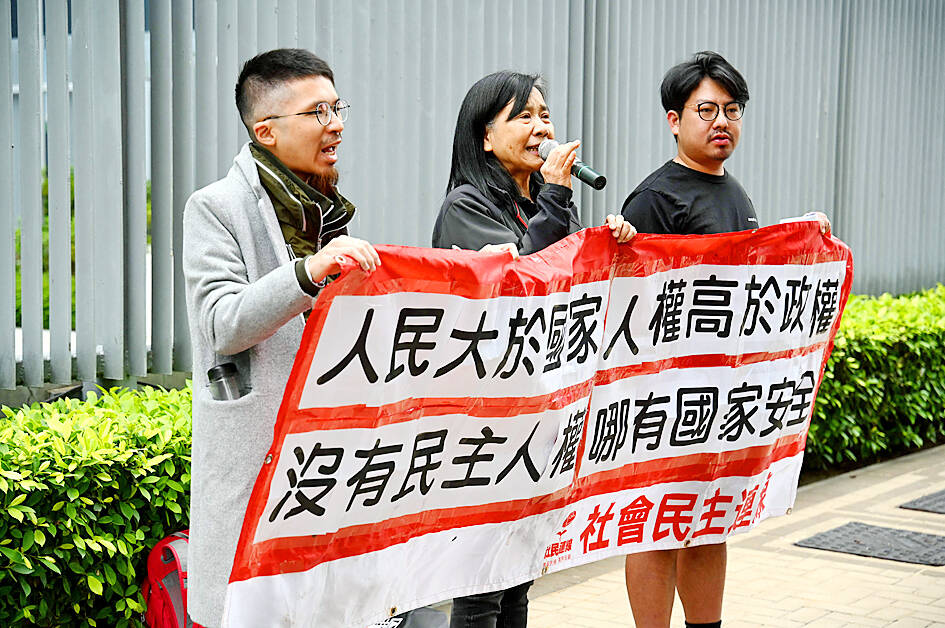Hong Kong democracy advocates yesterday staged a rare public protest against government plans for a new national security law, saying it lacked democratic oversight and human rights safeguards.
Public demonstrations have all but vanished in the Chinese territory since Beijing quelled huge, sometimes violent pro-democracy protests in 2019 and imposed a sweeping National Security Law.
Hong Kong officials now say a further homegrown security law is needed to plug “loopholes,” with Hong Kong Secretary for Justice Paul Lam (林定國) earlier saying that he heard no objections during a month of public consultations that ends today, but Yu Wai-pan, from the League of Social Democrats (LSD), yesterday said that “many Hong Kongers are quite concerned.”

Photo: AFP
“I don’t understand why the secretary for justice said he heard no objection or worry,” Yu said.
The LSD is one of the last remaining opposition groups in Hong Kong and its members have faced multiple prosecutions for their shows of dissent.
Yu and two other activists were surrounded by reporters and more than a dozen police officers as they chanted slogans outside the Hong Kong Government headquarters yesterday.
“National security is important to the people, but it must be based on democracy, freedom and rule of law,” activist Chan Po-ying (陳寶瑩) said.
The government referenced examples in the US and the UK in defending the proposed legislation, but Chan said that comparison was misleading, as Hong Kong is not a democracy.
The month-long public consultation for the new security law, known as Basic Law Article 23, was largely limited to pro-Beijing voices, she said.
Chinese Hong Kong and Macau Affairs Office Director Xia Baolong (夏寶龍) arrived in the territory last week in a tightly choreographed tour to meet with leaders in business and politics.
Xia discussed the security law proposal with two local lawyers’ groups in a closed-door meeting and engaged in “candid exchanges,” the head of the Hong Kong Bar Association told reporters.
Separately yesterday, Hong Kong convicted Joseph John — also known as Wong Kin-chung — of “conspiracy to incite secession,” the first such case involving a dual national.
The Portuguese citizen, 41, pleaded guilty to the national security offense, admitting that he was chair of the UK-based Hong Kong Independence Party and an administrator of its six online platforms.
A diplomatic source said that the Portuguese consulate has been unable to visit John since he was arrested and detained in November 2022.

Taiwan is gearing up to celebrate the New Year at events across the country, headlined by the annual countdown and Taipei 101 fireworks display at midnight. Many of the events are to be livesteamed online. See below for lineups and links: Taipei Taipei’s New Year’s Party 2026 is to begin at 7pm and run until 1am, with the theme “Sailing to the Future.” South Korean girl group KARA is headlining the concert at Taipei City Hall Plaza, with additional performances by Amber An (安心亞), Nick Chou (周湯豪), hip-hop trio Nine One One (玖壹壹), Bii (畢書盡), girl group Genblue (幻藍小熊) and more. The festivities are to

Auckland rang in 2026 with a downtown fireworks display launched from New Zealand’s tallest structure, Sky Tower, making it the first major city to greet the new year at a celebration dampened by rain, while crowds in Taipei braved the elements to watch Taipei 101’s display. South Pacific countries are the first to bid farewell to 2025. Clocks struck midnight in Auckland, with a population of 1.7 million, 18 hours before the famous ball was to drop in New York’s Times Square. The five-minute display involved 3,500 fireworks launched from the 240m Sky Tower. Smaller community events were canceled across New Zealand’s

‘IRRESPONSIBLE’: Beijing’s constant disruption of the ‘status quo’ in the Taiwan Strait has damaged peace, stability and security in the Indo-Pacific region, MOFA said The Presidential Office yesterday condemned China’s launch of another military drill around Taiwan, saying such actions are a “unilateral provocation” that destabilizes regional peace and stability. China should immediately stop the irresponsible and provocative actions, Presidential Office spokeswoman Karen Kuo (郭雅慧) said, after the Chinese People’s Liberation Army (PLA) yesterday announced the start of a new round of joint exercises around Taiwan by the army, navy and air force, which it said were approaching “from different directions.” Code-named “Justice Mission 2025,” the exercises would be conducted in the Taiwan Strait and in areas north, southwest, southeast and east of Taiwan

UNDER WAY: The contract for advanced sensor systems would be fulfilled in Florida, and is expected to be completed by June 2031, the Pentagon said Lockheed Martin has been given a contract involving foreign military sales to Taiwan to meet what Washington calls “an urgent operational need” of Taiwan’s air force, the Pentagon said on Wednesday. The contract has a ceiling value of US$328.5 million, with US$157.3 million in foreign military sales funds obligated at the time of award, the Pentagon said in a statement. “This contract provides for the procurement and delivery of 55 Infrared Search and Track Legion Enhanced Sensor Pods, processors, pod containers and processor containers required to meet the urgent operational need of the Taiwan air force,” it said. The contract’s work would be